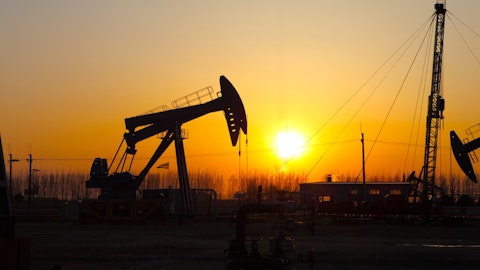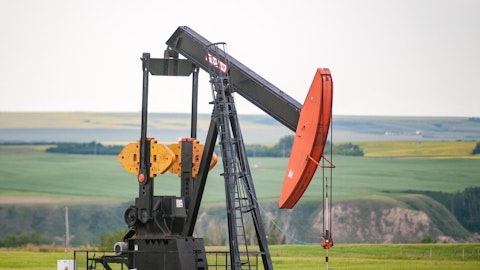And without energy security, you cannot transition. Europe has gone backwards on their emissions targets because of the lack of energy security. And the most important takeaway from all of this is where did Europe turn for energy security. They turn to natural gas. And so we think that the call for this product is only going to strengthen over time because natural gas is the key to providing energy security to Americans in the world.
Operator: Our next question is from John Abbott with Bank of America. Your line is now open.
John Abbott: Dave, thanks for all of the entire Bank of America team who wants to echo best your best wishes in your next chapter. Our first question is going to be on the Tug Hill and XcL Midstream acquisitions. So when you look at — so the guidance that you provided back in September of last year and when you sort of think about these acquisitions potentially closing in the middle of this year. First, is the midstream spend that you laid out in September still on track at XcL? And then second, how does your current thoughts on the potential impact of the breakeven include updated thoughts on inflation heading into this year.
David Khani: So you take the second. I’ll take the first. Okay. Go ahead.
Toby Rice: So as far as — what was the second part of the question there?
David Khani: Inflation into our breakeven.
Toby Rice: Yes. So I mean, the key thing with Tug Hill and the reason why those assets had such a low breakeven cost, was really due to the fact that they own their midstream and also the liquids percentage of their program that they’re running there. So yes, they’re going to be pay with inflation like every other operator and we’ll recast what that looks like from a CapEx perspective. The one thing I’d say is these are pretty high-quality assets. So the activity levels needed to maintain production will mitigate some of the service cost inflation effects. But hopefully, by the time we take over, we’ve seen a little bit more balance come from service costs.
David Khani: Yes. And then even incorporate — if you look at our long-term breakevens that we give you, that does incorporate some inflation embedded in there. So that does — and then as far as the midstream projects are concerned, some of those projects we were working on together were this M&A and some of those projects will absolutely continue through. As far as the rest, I think we’d have to wait and see until this closes to get an update from Tod on that.
John Abbott: And then our second question is sort of on the natural gas macro. Despite spot weakness, the forward curve is about 50% above year-ago levels with former storage, albeit after losing Freeport exports. What do you think is going on?
David Khani: I mean you have basically an oversupplied market heading into €˜23 in and I’ll call very modest oversupply in ’24. And then you’ve literally had Freeport and weather not show up, knocking the front end of the curve down and caused the modest oversupply increase. And so it’s basically sending a signal to the producers start to cut production because pricing is forcing your activity off-line. So and it’s also going to send demand up. And so it’s going to create a reaction to try to get to that balanced market, which you’re going to see from a combination of supply coming off or supply growth slowing, which will probably end up being about B a day of impact. You’ll also see about an incremental B plus of demand being forced back into the system between power from coal going away in the stack and then also industrial demand coming online.





